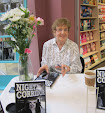
DIALOGUE
Believable dialogue will go a long way to making your novel successful. People do speak in different ways. Listen to the cab driver, the school teacher, your best friend. Each has his or her own unique way of expressing themselves. Then listen to your own characters, to what they say and how they say it. If you've created characters who are real to you, you will able able them speaking to one another. They will be alive to you in your imagination.
Here are a few lines of dialogue from Toni Morrison's The Bluest Eye:
The girls came out. Pecola with two drips of orange-pineapple. Maureen with black raspberry. You should have got some," she said. "They had all kinds. Don't eat down to the tip of the cone," she advised Pecola.
"Why?"
"Because there's a fly in there."
"How you know?"
"Oh, not really. A girl told me she found one in the bottom of hers once, and ever since then she throws that part away."
"Oh."
We passed Dreamland Theatre, and Betty Grable smiled down at us.
"Don't you just love her?" Maureen asked.
This is good dialogue interwoven with sense of time and place. Good dialogue gives the reader insight into the personalities of the characters. It also moves the story forward. Thesounds of their voices in the reader's mind helps bring the story to life. Like turning the audio up in a movie.
Here are a few lines of dialogue and description from "The Long Rain," by Peter Gadol.
I greeted Will Clark. He owned the store.
"Good morning, Jason," he said. "Except it's not a good morning is it?"
He was sitting on a stool next to a rack of blank keys. He always kept a pot of coffee going foanyone who stopped by, but the pot was empty. He was a big-bellied man with long arms that he had a habit of flapping while he spoke, as if he were trying to take flight but was too heavy to lift off his stool.
The Long Rain is a gripping tale, filled with suspense and atmosphere. It is also an artistic achievement. I don't think you can plan art, but you can plan a well-crafted story, much as a man builds a house. You first have to frame it, give it structure. If you take care of the craft of writing - and write the best story of which you are capable, you have the possibility of creating art. But if you set out to create great art, what generally results is pretentious and self-conscious. To quote Shakespeare, "The Play's the Thing."
Here is another example of excellent dialogue from my favorite novel of all time. Charlotte Bronte's Jane Eyre.
"Is it all over?" she said, looking down at my face. "Have you cried your grief away?"
"I'm afraid I never shall do that."
"Why?"
"Because I have been wrongly accused, and you, ma'am, and everybody else will now think me wicked."
"We shall think what you prove yourself to be, my child. Continue to act as a good girl, and you will satisfy me."
"Shall I, Miss Temple?"
Believeable dialogue goes a long way to making your novel work. And while we're on the subject, avoid those adverbs that end in 'ly', especially in dialogue. Example:
"Go home now," his brother growled.
"Go home now," his brother growled angrily.
The first is better.
Write active, vigorous sentences. Example: My first boyfriend will always be remembered by me. Better to write: I will alays remember my first boyfriend. Write with nouns and verbs, and avoid overuse of adverbs. But don't avoid them altogether. The right one in the right place can make the difference. There's a thin line, and only the you the author will 'sense' where it is.
A book I can't recommend strongly enough is THE ELEMENTS OF STYLE by Strunk and White. It's a thin little volume, but in my opinion, no writer should be without a copy. Mine is dog-earred; it has served me well. That, a good dictionary, and a thesaurus are really the only books you really need. Though you may ultimately accumulate a shelf full of writers' books over time, like I have. They are like old friends, always within easy reach when I need to spend time with those wo do what I do, and who I never cease to learn from.


No comments:
Post a Comment